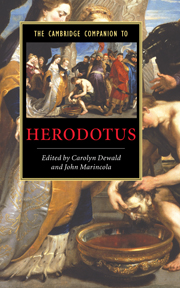Book contents
- Frontmatter
- Introduction
- 1 Herodotus and the poetry of the past
- 2 Herodotus and his prose predecessors
- 3 Herodotus and tragedy
- 4 The intellectual milieu of Herodotus
- 5 Meta-historiē: Method and genre in the Histories
- 6 The syntax of historiē: How Herodotus writes
- 7 Speech and narrative in the Histories
- 8 Herodotus, Sophocles and the woman who wanted her brother saved
- 9 Stories and storytelling in the Histories
- 10 Humour and danger in Herodotus
- 11 Location and dislocation in Herodotus
- 12 Herodotus and the natural world
- 13 Herodotus and Greek religion
- 14 Warfare in Herodotus
- 15 Herodotus, political history and political thought
- 16 Herodotus and the cities of mainland Greece
- 17 An alternate world: Herodotus and Italy
- 18 Herodotus and Persia
- 19 Herodotus and foreign lands
- 20 Herodotus' influence in antiquity
- Glossary
- Timeline
- Bibliography
- Index
- Series List
4 - The intellectual milieu of Herodotus
Published online by Cambridge University Press: 28 January 2007
- Frontmatter
- Introduction
- 1 Herodotus and the poetry of the past
- 2 Herodotus and his prose predecessors
- 3 Herodotus and tragedy
- 4 The intellectual milieu of Herodotus
- 5 Meta-historiē: Method and genre in the Histories
- 6 The syntax of historiē: How Herodotus writes
- 7 Speech and narrative in the Histories
- 8 Herodotus, Sophocles and the woman who wanted her brother saved
- 9 Stories and storytelling in the Histories
- 10 Humour and danger in Herodotus
- 11 Location and dislocation in Herodotus
- 12 Herodotus and the natural world
- 13 Herodotus and Greek religion
- 14 Warfare in Herodotus
- 15 Herodotus, political history and political thought
- 16 Herodotus and the cities of mainland Greece
- 17 An alternate world: Herodotus and Italy
- 18 Herodotus and Persia
- 19 Herodotus and foreign lands
- 20 Herodotus' influence in antiquity
- Glossary
- Timeline
- Bibliography
- Index
- Series List
Summary
The scope of the Histories, covering anthropology and geography, early origins and the grand narrative of Greek-barbarian relations culminating in the Persian Wars, is not to be found in any writer we know of before Herodotus. The story of the Persian Wars themselves has been called 'the greatest continuous prose narrative in Greek literature, and a literary masterpiece', but of course the Histories is more than a narrative, encompassing descriptions of virtually all the peoples of the known world. The Iliad and Odyssey could provide a model for narrative history, and remained the measure against which Herodotus and Thucydides set their histories. Herodotus opens with a promise to tell of the 'great and wondrous deeds' both of Greeks and of barbarians, to preserve the past before it gets forgotten, and show the cause (aitie) of the conflict. That aitie encompasses the many facets of the past, even the remote past, which could explain the Greek-barbarian conflict, and the past and present achievements, lands, peoples, customs, on either side.
It is not easy to pin down the antecedents of the Histories, still less the intellectual background. We can see points of contact between the Histories and certain Presocratic natural philosophers of the sixth-century Ionian Enlightenment, and they share a desire to make sense of the world in non-mythical and non-genealogical terms, which we could call 'rational'. Herodotus' contemporary world is also significant. A writer's background involves looking at earlier influences, but this can marginalise the question of interaction with or reaction to his contemporaries.
- Type
- Chapter
- Information
- The Cambridge Companion to Herodotus , pp. 60 - 75Publisher: Cambridge University PressPrint publication year: 2006
- 16
- Cited by

